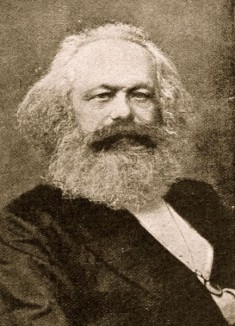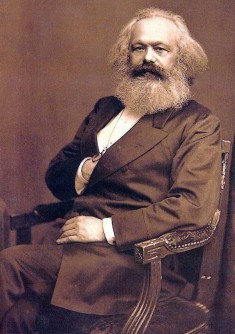Karl Marx was born on May 5, 1818, and he was a German philosopher, sociologist, economist, journalist, historian, and revolutionary socialist. He died on March 14, 1883, having changed the way the world functions concerning its economy, labor, and social relation to capital. During his life, he published many books, the two most famous being The Communist Manifesto in 1848 and Das Capital between 1867 and 1894.
Childhood and Early Life
Marx was born into a comfortable and fairly wealthy family in the town of Trier in Prussia. His ancestry on the side of his father was of Dutch rabbi, and his father, Herschel Marx, was the first in the family to receive a secular education. His family was deemed to be of relatively high class and they owned several Moselle vineyards. His father converted from Judaism to Protestant Christianity in order to avoid anti-Semitic legislation.
At 17 years of age, Marx enrolled in the faculty of law at the University of Bonn where he was engaged to Jenny von Westphalen, the daughter of the prominent Trier society. He became influenced by her father with romantic literature, but his own father sent him to the more renowned Berlin University where he spent a further four years in getting an education.
Here he would become a member of the young Hegelian movement and later, he moved to a career in journalism and became editor of the liberal newspaper Rheinische Zeitung. The paper was then closed by the Prussian government following the submission of many of Marx’s articles, and he then immigrated to France.
Marx’s Arrival in Paris
Marx arrived in Paris in late 1843. He began making contacts immediately with various sects of French socialists. He edited the Deutsch-Franzoische Jahrbucher, which was intended to bridge the gap between German radicals and French socialists. Marx became a communist on arrival in Paris and he set down his views in writings known as the Economical and Philosophical Manuscripts in 1844.
These writings outlined communism and capitalism within a communist society, but they would go unpublished until 1930. Marx also formed a lifelong friendship with Friedrich Engels whilst in Paris, a friendship that helped pave the future for himself and his young family.
Life in Brussels
 Marx was expelled from Paris in 1844, and he then moved to Brussels with Engels. During this time, he devoted himself to the study of history and at the same time formed links with England where he visited Engel’s family in Manchester. This conception of history, like many of his works, would be published posthumously, under the title The German Ideology.
Marx was expelled from Paris in 1844, and he then moved to Brussels with Engels. During this time, he devoted himself to the study of history and at the same time formed links with England where he visited Engel’s family in Manchester. This conception of history, like many of his works, would be published posthumously, under the title The German Ideology.
During the same time, Marx also wrote The Poverty of Philosophy and he also joined the Communist League. This league had its center in London, and Marx and Engels became its major theoreticians. They were commissioned to write a declaration in 1847. Just after publishing The Communist Manifesto in 1848, revolution broke out across Europe.
Settling in London
After returning to Paris when revolution broke out, Marx settled with Jenny in London where he sought refuge in 1849, writing two pamphlets on the revolution and its aftermath. Marx lived in poverty in Soho, London, with Jenny and their four children in a three-bedroom flat. Two more children were born to Marx and Jenny, but only three of the six survived. His income came from the Engels family’s cotton business in Manchester as well as from articles he submitted to the New York Daily Tribune.
Marx’s Legacy
The last decade of Marx’s life was plagued by ill health, but he still managed to contribute on political and social issues. It would not be until after his death, however, that many of his works would be published, read, and respected. Marx taught the modern world about socialism through his writings, gaining more respect after his death than when he was alive.
Marx is considered one of the most influential historians, scientists and sociologists of the 19th century. Although his thoughts and methods were ignored during his lifetime, they would then be recognized by the scholars after his death. Original ideas of Marx have been altered with the passing of time, but it can be said that until recently over half the population were living under regimes that were Marxist.
